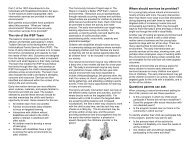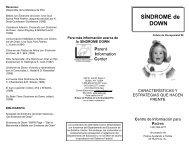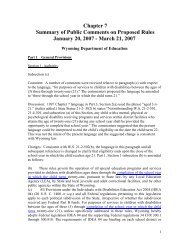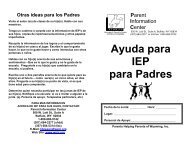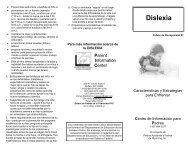What is Prior Written Notice? - Parent Information Center
What is Prior Written Notice? - Parent Information Center
What is Prior Written Notice? - Parent Information Center
You also want an ePaper? Increase the reach of your titles
YUMPU automatically turns print PDFs into web optimized ePapers that Google loves.
<strong>What</strong> <strong>is</strong> <strong>Prior</strong> <strong>Written</strong> <strong>Notice</strong>?<br />
Anyone who has navigated the IEP (Individualized<br />
Education Program) process knows that there <strong>is</strong> no<br />
shortage of paperwork involved! <strong>Parent</strong>s of students<br />
who participate in special education receive a variety<br />
of forms and documents that provide important legal<br />
protections, as well documentation for their child’s<br />
educational program. One kind of form parents will<br />
see <strong>is</strong> called <strong>Prior</strong> <strong>Written</strong> <strong>Notice</strong>.<br />
<strong>Prior</strong> <strong>Written</strong> <strong>Notice</strong> <strong>is</strong> just what its name suggests—<br />
<strong>Notice</strong> that school teams are required to provide to<br />
parents in writing before (prior to) taking or refusing to<br />
take certain actions that impact a child’s educational<br />
program. However, the term “prior” can be<br />
m<strong>is</strong>leading at times, since parents may not receive<br />
the actual written notice until after a dec<strong>is</strong>ion <strong>is</strong> made,<br />
at an IEP meeting for example.<br />
Is <strong>Prior</strong> <strong>Written</strong> <strong>Notice</strong> the Same as Informed<br />
Consent or <strong>Notice</strong> of Meeting?<br />
No, <strong>Prior</strong> written notice <strong>is</strong> not the same as either<br />
Informed Consent or <strong>Notice</strong> of Meeting. Informed<br />
consent refers to perm<strong>is</strong>sion from parents to move<br />
forward with a particular step in the special education<br />
process. It means that parents have had all of the<br />
relevant information clearly explained to them, in<br />
terms and in a language that they understand, and<br />
they are signing their perm<strong>is</strong>sion to go forward with<br />
an evaluation, and consent for services. While<br />
informed consent and <strong>Prior</strong> <strong>Written</strong> <strong>Notice</strong> are often<br />
required in similar circumstances, <strong>Prior</strong> <strong>Written</strong> <strong>Notice</strong><br />
reflects actual considerations and dec<strong>is</strong>ions of the<br />
IEP team and must contain certain information as<br />
outlined below. In addition, a meeting notice <strong>is</strong> a<br />
notice that lets a family know about a proposed<br />
meeting. The notices of meetings to be held are also<br />
separate from <strong>Prior</strong> <strong>Written</strong> <strong>Notice</strong> and require a<br />
separate form.<br />
When <strong>is</strong> <strong>Prior</strong> <strong>Written</strong> <strong>Notice</strong> Used?<br />
The Individuals with D<strong>is</strong>abilities Education Act (IDEA)<br />
states that school teams must provide parents with<br />
<strong>Prior</strong> <strong>Written</strong> <strong>Notice</strong> before they:<br />
1. Propose to initiate (start) to change the<br />
identification, evaluation, or educational placement<br />
of your child, or the prov<strong>is</strong>ion of a free appropriate<br />
public education (FAPE) to your child; or<br />
2. Refuse to initiate or to change the identification,<br />
evaluation, or educational placement of your child<br />
or the prov<strong>is</strong>ion of FAPE to your child (see FAPE<br />
below).<br />
For example, let’s say that Sally’s parents request<br />
that she be evaluated for special education services.<br />
The school must provide her parents with <strong>Prior</strong><br />
<strong>Written</strong> <strong>Notice</strong> and obtain written consent before the<br />
evaluation can begin, even though it was at the<br />
parent’s request. Once the evaluation <strong>is</strong> complete,<br />
let’s say that the school team finds Sally eligible for<br />
special education services. Before Sally can be<br />
identified as a child with a d<strong>is</strong>ability, and before she<br />
can begin receiving services, the school team once<br />
must again provide her parents with <strong>Prior</strong> <strong>Written</strong><br />
<strong>Notice</strong>.<br />
Three years later, Sally’s team agrees that additional<br />
evaluation data <strong>is</strong> needed. They must again provide<br />
Sally’s parents with <strong>Prior</strong> <strong>Written</strong> <strong>Notice</strong> before<br />
beginning another evaluation. As Sally continues in<br />
her special education program, the school must<br />
provide her parents with <strong>Prior</strong> <strong>Written</strong> notice each<br />
time they propose or refuse to conduct an evaluation<br />
and each time they propose or refuse to change her<br />
placement. If the school team one day finds that<br />
Sally <strong>is</strong> no longer eligible for special education<br />
services, then they must provide <strong>Prior</strong> <strong>Written</strong> <strong>Notice</strong><br />
at th<strong>is</strong> time as well.<br />
The law also states that <strong>Prior</strong> <strong>Written</strong> <strong>Notice</strong> must be<br />
given if the school team proposes to initiate or<br />
change the prov<strong>is</strong>ion of a “free and appropriate<br />
education” (FAPE). In order to fully understand the<br />
requirements for <strong>Prior</strong> <strong>Written</strong> <strong>Notice</strong>, it <strong>is</strong> important to<br />
understand what <strong>is</strong> meant by FAPE. IDEA requires a<br />
school d<strong>is</strong>trict to provide FAPE to each eligible<br />
student with a d<strong>is</strong>ability, ages 3 to 21 years old, and<br />
<strong>is</strong> in need of specialized instruction, within the school<br />
d<strong>is</strong>trict’s jur<strong>is</strong>diction, regardless of the nature or<br />
severity of the person’s d<strong>is</strong>ability. In order to be<br />
considered “appropriate,” education services must:<br />
Meet the needs of the student with the d<strong>is</strong>ability as<br />
adequately as the needs of students without<br />
d<strong>is</strong>abilities;<br />
Allow the student with d<strong>is</strong>abilities to remain with h<strong>is</strong><br />
or her non-d<strong>is</strong>abled peers as much as possible;<br />
Use appropriate evaluation, re-evaluation, and<br />
placement procedures; and<br />
Include due process procedures (i.e. d<strong>is</strong>pute<br />
resolution such as mediation).<br />
For instance, let us suppose that Sally’s parents<br />
make a request for her to receive additional time with<br />
the speech-language patholog<strong>is</strong>t. Believing that th<strong>is</strong><br />
<strong>is</strong> necessary in order for Sally to receive FAPE, her<br />
parents request it verbally or in writing. However,<br />
after considering the parents’ request and input, the<br />
school team determines that additional time <strong>is</strong> not<br />
supported by Sally’s recent evaluation and that<br />
granting the request would prevent Sally from<br />
remaining with her non-d<strong>is</strong>abled peers to the<br />
maximum extent possible. Because the school team<br />
<strong>is</strong> refusing make changes that relate to the prov<strong>is</strong>ion<br />
of FAPE, they must provide the parents with <strong>Prior</strong><br />
<strong>Written</strong> <strong>Notice</strong>. Sally’s parents may then decide if<br />
they w<strong>is</strong>h to pursue any of the d<strong>is</strong>pute resolution<br />
procedures that are outlined in IDEA (see PIC’s Solving<br />
Problems at School d<strong>is</strong>ability brochure for more<br />
information).<br />
Other scenarios where the school team must provide<br />
<strong>Prior</strong> <strong>Written</strong> <strong>Notice</strong> include:<br />
D<strong>is</strong>ciplinary changes in placement; and<br />
Revocation of parental consent for special<br />
education services (call PIC if you have questions on<br />
revocation).<br />
<strong>What</strong> Must <strong>Prior</strong> <strong>Written</strong> <strong>Notice</strong> Include?<br />
According to IDEA, there are certain things that must<br />
be included in a <strong>Prior</strong> <strong>Written</strong> <strong>Notice</strong>. The notice<br />
must:<br />
1. Describe the action that your school d<strong>is</strong>trict<br />
proposes or refuses to take;<br />
2. Explain why your school d<strong>is</strong>trict <strong>is</strong> proposing or<br />
refusing to take the action;<br />
3. Describe each evaluation procedure, assessment,<br />
record, or report your school d<strong>is</strong>trict used in<br />
deciding to propose or refuse the action;<br />
4. Include a statement that you have protections<br />
under the IDEA;
5. Tell you how you can obtain a copy of the<br />
procedural safeguards;<br />
6. Include resources for you to contact for help<br />
understanding your rights;<br />
7. Describe any other options that your child's<br />
individualized education program (IEP) team<br />
considered and the reasons why those options<br />
were rejected; and<br />
8. Provide a description of other factors that are<br />
relevant to your school d<strong>is</strong>trict’s proposal or<br />
refusal.<br />
The law also requires that the notice be:<br />
1. <strong>Written</strong> in language understandable to the general<br />
public; and<br />
2. Provided in your native language or other mode of<br />
communication you use, unless it <strong>is</strong> clearly not<br />
possible to do so.<br />
If your native language or other mode of<br />
communication <strong>is</strong> not a written language, your school<br />
d<strong>is</strong>trict must ensure that:<br />
1. The notice <strong>is</strong> translated for you orally by other<br />
means in your native language or other mode of<br />
communication;<br />
2. You understand the content of the notice; and<br />
3. There <strong>is</strong> written proof (evidence) that #1 and #2<br />
have been met.<br />
Why <strong>is</strong> <strong>Prior</strong> <strong>Written</strong> <strong>Notice</strong> Important to Me?<br />
<strong>Prior</strong> <strong>Written</strong> <strong>Notice</strong> <strong>is</strong> important for a number of<br />
reasons. For one, it helps ensure that parents are<br />
included in and aware of dec<strong>is</strong>ions that impact their<br />
child’s educational program.<br />
<strong>Prior</strong> <strong>Written</strong> <strong>Notice</strong> <strong>is</strong> also important because it helps<br />
ensure that careful consideration takes place before<br />
dec<strong>is</strong>ions are made. For example, when Sally’s<br />
parents requested additional time with the speechlanguage<br />
patholog<strong>is</strong>t, the school did not simply say<br />
“no.” <strong>Prior</strong> <strong>Written</strong> <strong>Notice</strong> required the school team to<br />
explain why they made that dec<strong>is</strong>ion and what data<br />
they used. It also required the school team to<br />
consider other alternatives for addressing Sally’s<br />
needs.<br />
If, after receiving the school team’s explanation,<br />
Sally’s parents still d<strong>is</strong>agreed, they would now have a<br />
written record of the request that could be used<br />
during d<strong>is</strong>pute resolution proceedings.<br />
<strong>Prior</strong> <strong>Written</strong> <strong>Notice</strong> <strong>is</strong> a valuable tool for parents and<br />
professionals. For more information about th<strong>is</strong><br />
important document, v<strong>is</strong>it idea.ed.gov or<br />
www2.ed.gov<br />
For more information on<br />
PRIOR WRITTEN NOTICE<br />
CONTACT:<br />
<strong>Parent</strong><br />
<strong>Information</strong><br />
<strong>Center</strong><br />
500 W. Lott St, Suite A<br />
Buffalo, WY 82834<br />
(307) 684-2277 (v/tdd)<br />
tdawson@wpic.org<br />
www.wpic.org<br />
To talk with the<br />
PIC Outreach <strong>Parent</strong> Lia<strong>is</strong>on<br />
in your area, contact:<br />
PHP of WY <strong>is</strong> a non-profit, 501(c) 3 organization;<br />
therefore, your donation <strong>is</strong> tax deductible. We<br />
welcome all donations. Every donation helps us<br />
strengthen our network of support for families.<br />
The contents of th<strong>is</strong> brochure were developed under a grant<br />
from the U.S. Department of Education. However, the<br />
contents do not necessarily represent the policy of the<br />
Department of Education, and endorsement by the Federal<br />
Government should not be assumed.<br />
<strong>Prior</strong> <strong>Written</strong><br />
<strong>Notice</strong><br />
D<strong>is</strong>ability Brochure #28<br />
Why it <strong>is</strong> Important for<br />
You and Your Child<br />
<strong>Parent</strong> <strong>Information</strong> <strong>Center</strong><br />
1 (307) 684-2277<br />
A Project of<br />
<strong>Parent</strong>s Helping <strong>Parent</strong>s<br />
of Wyoming, Inc.



